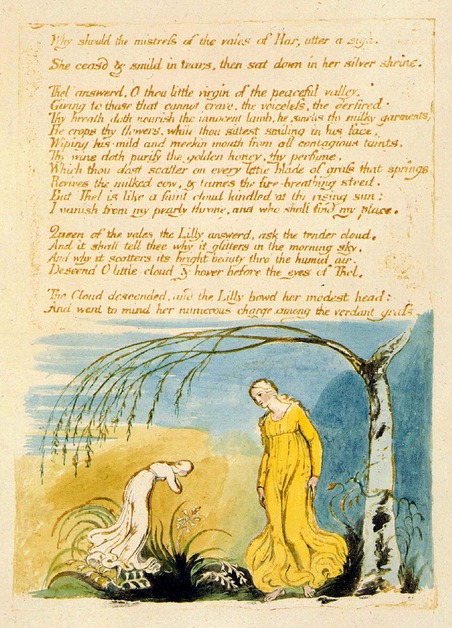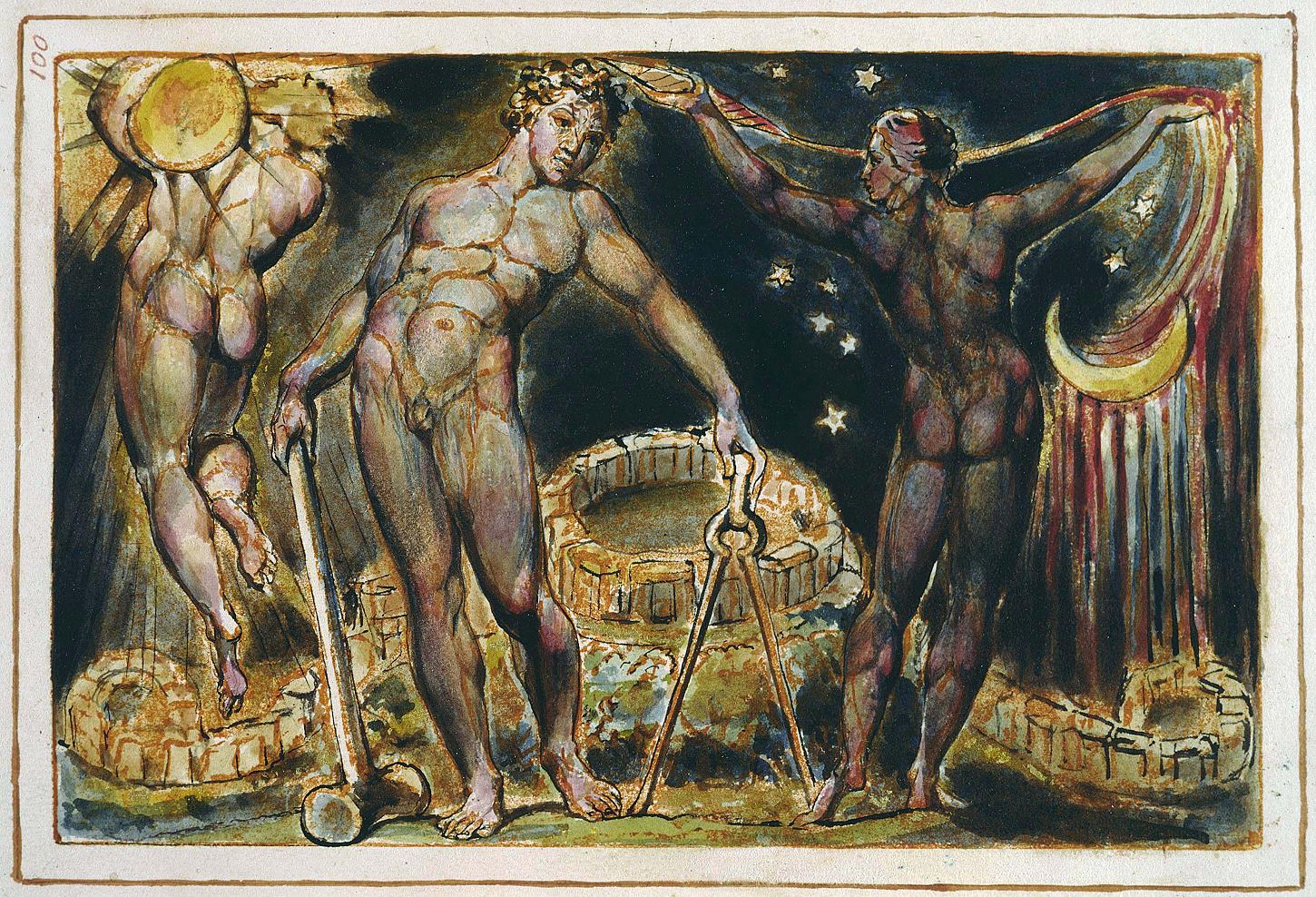 |
British Museum
Jerusalem
Plate 3
|
Here Blake inserted lines of conventional poetry with rhyme and predictable rhythm. Notable in this section is the reference to Sinai where Moses received the tablets of law. Blake intended to hear that voice which spoke to Moses and record it in the book he wrote. He recognized that it is not men who are in charge of events but Spirits.
Next Blake, by including Greek words which were
 |
British Museum
Jerusalem
Plate 4
|
Matthew 5
[32] And before him shall be gathered all nations: and he shall separate them one from another, as a shepherd divideth his sheep from the goats:
[33] And he shall set the sheep on his right hand, but the goats on the left.
The passage which follows explained Blake's choice of a poetic form. He would exercise the freedom not to be bound by rhyme or meter. His criteria for writing his poetry was carefully choosing the fit letter, word, cadence, or number of syllables. In accordance with his philosophy of Liberty as expression of Spirit he would write poetry unfettered by traditional rules.
Continuing onto the next plate he made another reference to the New Testament by inserting the Greek words for 'Jesus only'. One location of these words is Mark 9:8, "And suddenly, when they had looked round about, they saw no man any more, save Jesus only with themselves."
Chapter 1 proper began with his stated theme: "the passage through Eternal Death! and of the awaking to Eternal Life." He asserted that the words were his to write, but were dictated to him by the Savior.
Jerusalem, Plate 3, (E 145)
"To the Public
After my three years slumber on the banks of the Ocean, I
again display my Giant forms to the Public: My former Giants &
Fairies having reciev'd the highest reward possible: the
[love] and [friendship] of those with whom to
be connected, is to be [blessed]: I cannot doubt that
this more consolidated & extended Work, will be as kindly
recieved
The Enthusiasm of the following Poem, the Author hopes
[no Reader will think presumptuousness or arroganc[e] when he
is reminded that the Ancients acknowledge their love to their
Deities, to the full as Enthusiastically as I have who
Acknowledge mine for my Saviour and Lord, for they were wholly
absorb'd in their Gods.] I also hope the Reader will
be with me, wholly One in Jesus our Lord, who is the God [of
Fire] and Lord [of Love] to whom the Ancients
look'd and saw his day afar off, with trembling & amazement.
The Spirit of Jesus is continual forgiveness of Sin: he who
waits to be righteous before he enters into the Saviours kingdom,
the Divine Body; will never enter there. I am perhaps the most
sinful of men! I pretend not to holiness! yet I pretend to love,
to see, to converse with daily, as man with man, & the more to
have an interest in the Friend of Sinners. Therefore
[Dear] Reader, [forgive] what you do not
approve, & [love] me for this energetic exertion of my
talent.
Reader! [lover] of books! [lover] of heaven,
And of that God from whom [all books are given,]
Who in mysterious Sinais awful cave
To Man the wond'rous art of writing gave,
Again he speaks in thunder and in fire!
Thunder of Thought, & flames of fierce desire:
Even from the depths of Hell his voice I hear,
Within the unfathomd caverns of my Ear.
Therefore I print; nor vain my types shall be:
Heaven, Earth & Hell, henceforth shall live in harmony
Of the Measure, in which
the following Poem is written
We who dwell on Earth can do nothing of ourselves, every
thing is conducted by Spirits, no less than Digestion or Sleep.
<Greek>E*do*O*n *mo*i
*p*a*s*a *e*zo*u*s*i*a *e*n o*u*r*a*n*o k*a*i *e*p*i *g*e*s
</Greek>
[Matthew 5:32-33
[32] And before him shall be gathered all nations: and he shall
separate them one from another, as a shepherd divideth his sheep from
the goats:
[33] And he shall set the sheep on his right hand, but the goats on the left.]
When this Verse was first dictated to me I consider'd a
Monotonous Cadence like that used by Milton & Shakspeare & all
writers of English Blank Verse, derived from the modern bondage
of Rhyming; to be a necessary and indispensible part of Verse.
But I soon found that
in the mouth of a true Orator such monotony was not only awkward,
but as much a bondage as rhyme itself. I therefore have produced
a variety in every line, both of cadences & number of syllables.
Every word and every letter is studied and put into its fit
place: the terrific numbers are reserved for the terrific
parts--the mild & gentle, for the mild & gentle parts, and the
prosaic, for inferior parts: all are necessary to each ot her.
Poetry Fetter'd, Fetters the Human Race! Nations are Destroy'd,
or Flourish, in proportion as Their Poetry Painting and Music,
are Destroy'd or Flourish! The Primeval State of Man, was Wisdom,
Art, and Science. t
PLATE 4
<Greek>Mo*no*s *o I*e*so*u*s </Greek>
[Jesus only - example - Mark 9:8 And suddenly, when they had looked round about,
they saw no man any more, save Jesus only with themselves.]
Jerusalem
Chap: I
Of the Sleep of Ulro! and of the passage through
Eternal Death! and of the awaking to Eternal Life.
This theme calls me in sleep night after night, & ev'ry morn
Awakes me at sun-rise, then I see the Saviour over me
Spreading his beams of love, & dictating the words of this mild song."
.
_object_45_The_Little_Vagabond.jpg)


_object_34_The_Little_Girl_Lost.jpg)



